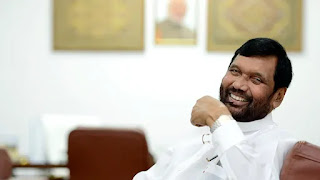Ram Vilas Paswan, Dalit leader from Bihar who brought human touch to policy-making

Ram Vilas Paswan would be remembered as an intelligent politician; who would find himself at the right side of the ruling combination in national politics. A 10-time member of parliament, eight out of which ten victories were from Hajipur Lok Sabha seat in Bihar.
Since 1989, when the country began with the coalition era of politics, Paswan managed to sit on treasury benches in almost all combinations —spread from extreme left to right. Paswan has served as a Union Minister under five different prime ministers.
Paswan, as minister, would also be remembered for bringing in some big changes. Opening up the telecom sector, digitalisation of food procurement system, laying down infrastructure for one nation one ration cards and making service charges optional for consumers at restaurants being some of them.
Recent alterations to the essential commodities act, allowing farmers and traders to hold their crops of oil seeds, cereals and pulses, were also done under his tenure. Although he could not table the bill in parliament (as he was undergoing treatment for heart ailment at Delhi’s Apollo hospital), most of the spadework and consultations were done with him leading the chair.
It was during his tenure as Communication and Information Technology Minister between 1999 to 2001, that India started opening up the sector. Bringing in new private players challenging the monopoly of public sector behemoth BSNL. He was later moved to the mines ministry; and Pramod Mahajan built upon the work done by him.
In April 2002, Paswan quit the Atal Bihari Vajpayee led National Democratic Alliance (NDA), blaming the mishandling of the Gujarat riots.
In 1999, it was Paswan and Sharad Yadav along with Ram Krishna Hegde who broke from Janta Dal to merge their faction with George Fernandez and Nitish Kumar-led Samta Party to form JD(U), one of the largest constituents of NDA. But by 2002, he had a fall out with Sharad Yadav and Nitish Kumar in Bihar’s politics, forcing him to join hands with his bete noire Lalu Prasad.
Despite his love-hate relationships with Lalu, both remained part of two UPA governments. Only to return to NDA at the insistence of his son and now his party LJP’s national president Chirag Paswan.
During his stint in the Food and Consumer Affairs Ministry as part of Prime Minister Narendra Modi’s government, Ram Vilas Paswan pushed the digitalisation of records of Food Corporation of India (FCI), food procurement and linked all the ration cards with Aadhar cards, weeding out 21 crore odd ration cards issued to “non-deserving” beneficiaries. All this not only cut down on wasteful expenditure but accelerated food procurement and movement of grains.
India offers food to its 80 crore beneficiaries (from poor families) through PDS. This was the first step towards digitalisation and standardisation of these cards. Now, every card in the country has information in three languages- Hindi, English and the local language of the state. The next step is to make the cards portable. This will allow the beneficiary to take the card anywhere in the country and avail of its benefits at the nearest PDS centre.
For restaurant goers, Paswan took great interest in abolishing the levy of service charges albiet under pressure from restaurant lobby groups. However, Paswan forced these charges non-mandatory.
Ram Vilas Paswan might have had an image of a politician as a product of caste-based pocket borough. But thanks to his understanding of the pulse of India, he brought the human touch to policy making




Post a Comment